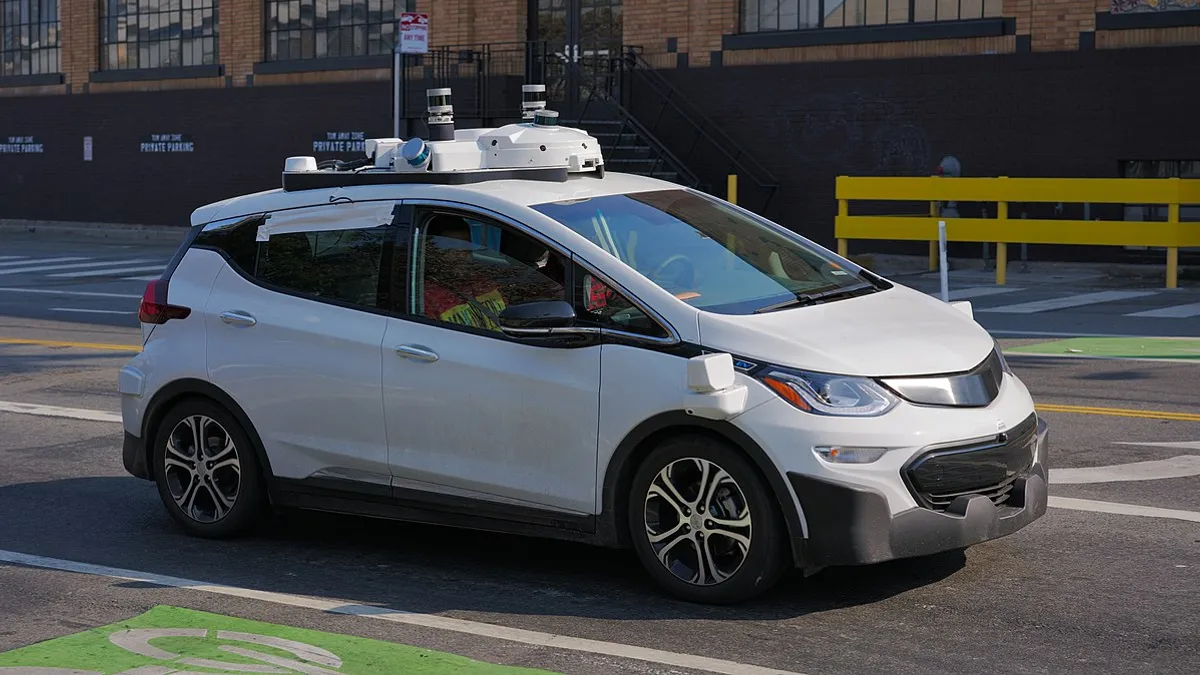Dive Brief:
- The California Public Utilities Commission (CPUC) approved last week two new autonomous vehicle (AV) programs — one for "drivered" companies and the other for driverless — that will allow companies to accept compensation on fare-based shared AV trips for the public.
- Under the "drivered" program, transportation charter party carrier (TCP) permit-holders are authorized to add test AVs to their existing passenger fleets, but only with test operators present. Under the driverless program, TCP permit-holders with a testing permit for driverless vehicles can run passenger AV service with a remote operator, pending the submission of a Passenger Safety Plan to outline protections under driverless operations.
- Participating companies are required to submit quarterly reports and data to CPUC detailing information regarding pick-up and drop-off locations, vehicle fuel type and vehicle miles traveled. CPUC also has a particular focus on supporting disadvantaged communities (DACs), with companies required to report on their availability of wheelchair accessible rides, service levels to disadvantaged communities and engagement with accessibility advocates.
Dive Insight:
In a statement to Smart Cities Dive on Nov. 20, CPUC said the program has had no applicants yet as it had just been approved. Seven companies — Zoox, AutoX, Pony.ai, Waymo, Aurora Innovation, Cruise and Voyage — hold permits for the private, prearranged transportation of passengers in test AVs, and this recent decision could capture the interest of other AV companies hoping to enter the California market.
States including Nevada and Arizona have permitted fare-based AV services for some time now. In Las Vegas, driverless technology company Motional has worked with Lyft since 2018 on a driverless robotaxi service in which passengers are "able to experience self-driving technology first-hand while enjoying the comfort and convenience of a traditional Lyft ride," said Motional Vice President of Marketing Gretchen Effgen in an earlier interview.
And in Arizona, Waymo has operated its driverless ride-hailing service Waymo One in the East Valley of Phoenix — including Chandler, Gilbert, Mesa and Tempe — since late 2018. In its first year, the service delivered more than 100,000 trips to more than 1,500 monthly riders in the Phoenix area.
This decision from CPUC "comes at a key time" for Waymo, a company official told TechCrunch in a statement. Waymo has expanded its reach in California's Bay Area through package delivery services, and this "long-awaited agency action" opens the doors for Waymo One to join a growing portfolio of offerings in its home state.
CPUC has touted its decision, saying it "establishes four goals" that apply widely to AV programs in California: protect passenger safety, expand the benefits of AV technologies, improve transportation options and access, and reduce greenhouse gas (GHG) emissions and air pollutants. California transportation agencies, however, are not as gung-ho on this next step in the expansion of AV services.
In December 2019, various parties including the Los Angeles Department of Transportation (LADOT), San Francisco Municipal Transportation Agency (SFMTA) and San Francisco County Transportation Authority (SFCTA) were asked to comment on the proposed AV programs. The agencies all said CPUC should not authorize fare collection "because testing periods should focus on safety and other policy goals, not generating revenue for the service providers." LADOT urged CPUC to use fare revenues for accessibility and equity programs, should the authorization proceed.
"Parties are correct to highlight that the Commission already recognizes the many burdens faced by DACs including a lack of access to transit options and a disproportionate share of the environmental and health burdens caused by transportation services like particulate emissions from passenger vehicles," CPUC said in its proposed decision. It went on to say while it's "too soon" to set uniform equity targets, it will reconsider "as the market matures."












